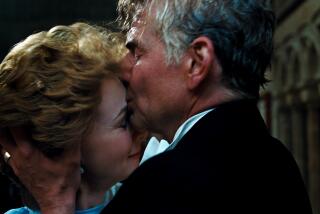Review: Violinist Leila Josefowicz is a powerful storyteller in John Adams’ ‘Scheherazade.2’
John Adams’ “Scheherazade.2,” an epic new violin concerto written for Leila Josefowicz and performed by the Los Angeles Philharmonic Thursday night with the composer conducting, was given its premiere in New York in March 2015. A second performance 13 months later of a concerto by a major American composer featuring a prominent soloist is not unusual.
But this “Scheherazade” has been around the block and then some. L.A. almost seems late in the game. Josefowicz has already played it with various orchestras and under various conductors in Amsterdam, London, Helsinki, Vienna, Salzburg, Innsbruck, Atlanta, St. Louis, Sydney — I’m probably forgetting some. The Seattle Symphony got the West Coast premiere last month. In May, Toronto.
While acclaim has been the norm for the concerto, it has also gotten a dose of notoriety as well. In his comments to the audience at the New York Philharmonic premiere, Adams made a crack about Rush Limbaugh. Characteristically, Limbaugh responded in condemnatory kind.
“Scheherazade.2” is very much a concerto, but Adams also calls it a dramatic symphony in the manner of Berlioz’s dramatically structured symphonic works. The composer writes that, while reading “One Thousand and One Nights” based on a woman having to save her life by tricking and entertaining a tyrant, he was struck by resonances with the plight of women in the Middle East where religious fanaticism today reigns. And for that matter the inescapable Internet images of abused women and attitudes expressed on talk radio (which is where Limbaugh comes in).
Thus in the manner of the traditional concerto in which soloist and orchestra represent the individual against the masses, Josefowicz becomes the modern woman facing off against a hostile society. Throughout the 50-minute tour-de-force, she becomes a violinist using all her wiles — physical, intellectual and spiritual.
There is no story but rather images for the four movements.
In the first Scheherazade is pursued by the “True Believers.” The second (“Long Desire”) begins with pounding chords that begrudgingly give way to uneasy sensuality, love here as violence appeased. The oppressively powerful third movement, “Scheherazade and the Men With Beards,” is stern judgment. The last movement is her breathtaking and exhausting escape.
FULL COVERAGE: Spring 2016 arts preview | Exhibits | Theater | Dance | Pop music | Books
It might be easy to see why so dramatic and timely a concerto by one of most heralded and popular composers would easily catch on. Moreover, this is the first piece Adams has written for Josefowicz, who has spectacularly championed his works for the last 15 years (since she was a star already at 21), and her performance is an amazing feat of an instrumentalist assuming a theatrical role. One of the commissioners of Adams’ 1994 groundbreaking Violin Concerto was New York City Ballet. The new concerto is now one that could be staged.
Adams’ familiar trademarks are present, thematically, politically and, of course, musically. His operas are strongly and sometimes controversially feminist. His last large-scale work, “The Gospel According to the Other Mary,” is a retelling of the last days of Jesus from the point of view of the women present. The opera he is now working on is about the California Gold Rush, also attending to the women’s roles.
Another Adams concern is his relation to classical music’s past, his rethinking the likes of Ives, Beethoven, Handel and Takemitsu. Now it is Rimsky-Korsakov’s “Scheherazade,” the lush, rambling, atmospheric evocations of four of the “One Thousand and One Nights” stories, replete with gorgeous violin solos.
Even so, there is little easy about “Scheherazade.2.” For all its power and character, this is a confusing concerto and a challenging listen.
Unlike Rimsky, Adams makes no reference to specific tales (some of which happen to relate the abuse of women to men), but he does assume the ramble and the atmosphere.
Adams is a brilliant orchestrator. The instrumental texture is ever changing. Solos regularly appear out of nowhere. The Hungarian cimbalom, a hammered dulcimer boldly played by Chester Englander, is featured throughout, adding a mysterious folk quality, if not exactly Middle Eastern. The big ensemble is a many-faceted and multicolored beast, threatening a lot of the time but capable of captivating tenderness.
The changeableness is a listener’s biggest obstacle. It will require considerable familiarity to know what is really going on here. Adams has strongly voiced his disapproval of Modernism, and “Scheherazade.2” is far from 12-tone in its harmonic or melodic language, but the angularity, the lack of repetition, the continual shifts in dramatic mood and non-narrative arc remind me of nothing more than Schoenberg’s great Violin Concerto.
What one does takes away from initial visits to the concerto will likely revolve about Josefowicz. Personifying Scheherazade, her performance requires no explication. Her virtuosity is extraordinary, but even more extraordinary is her expressive power. She is the Wonder Woman of violinists, physically able to respond to whatever is thrown at her but also temperamentally and theatrically transformative. She carries the concerto.
Adams began the program boldly with Respighi’s flashy tone poems “The Fountains of Rome” and “The Pines of Rome.” His strong suit as conductor is rhythm rather than grace or nuance. The orchestra made a brash display, reaching its decibel maximum with the last of the Roman pines, which seemed set aflame with Roman candles setting the scene for Scheherazade’s upcoming big show.
------------------------------------------
John Adams conducts the Los Angeles Philharmonic
Where: Walt Disney Concert Hall, downtown Los Angeles
When: 8 p.m. Friday and Saturday
Cost: $26.50-$195.50
Info: (323) 850-2000 or www.laphil.org
More to Read
The biggest entertainment stories
Get our big stories about Hollywood, film, television, music, arts, culture and more right in your inbox as soon as they publish.
You may occasionally receive promotional content from the Los Angeles Times.







